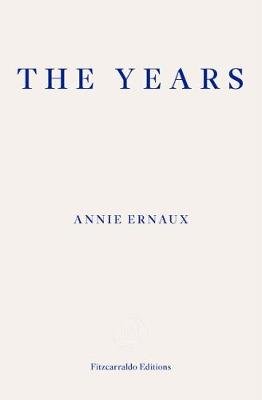Annie Ernaux, The Years (2008)
Translated from the French by Alison L. Strayer (2017)

Annie Ernaux’s The Years begins with a series of scattered memories, and reflections on the ephemeral nature of existence:
Everything will be erased in a second. The dictionary of words amassed between cradle and deathbed, eliminated. All there will be is silence and no words to say it. Nothing will come out of the open mouth, neither I nor me. Language will continue to put the world into words. In conversation around a holiday table, we will be nothing but a first name, increasingly faceless, until we vanish into the vast anonymity of a distant generation.
This paragraph stopped me in my tracks; it wouldn’t be the last time that happened during the book.
I can understand now I’ve read it why The Years has been accepted as a novel for the purposes of the Man Booker International Prize: it’s not so much the detail of history that lingers as the shape of the text. I’d describe The Years as an individual (auto)biography suspended in a broader account of history. It follows the life and times of a character (presumably a version of Ernaux herself) from 1941 to 2006. The wider historical canvas is mostly kept at ‘eye level’, stitched together from details that emphasise the experience of living through a particular moment in time. For example, the 1950s:
Beneath the surface of the things that never changed, last year’s circus posters with the photo of Roger Lanzac, First Communion photos handed out to schoolfriends, the Club des chansonniers on Radio Luxembourg, our days swelled with new desires. On Sunday afternoons, we crowded around the windows of the general electrics shop to watch television. Cafés invested in TV sets to lure clientele.
Ernaux also evokes the ways in which her protagonist’s mental landscapes change. The world of childhood, immediately after the Second World War, is a world of family voices telling stories, and traditions handed down:
Memory was transmitted not only through the stories but through the ways of walking, sitting, talking, laughing, eating, hailing someone, grabbing hold of objects. It passed body to body, over the years, from the remotest countrysides of France and other parts of Europe: a heritage unseen in the photos, lying beyond individual difference and the gaps between the goodness of some and the wickedness of others.
Over the period narrated in The Years, the old voices fade and machines become the main repository of knowledge (“Only facts presented on TV achieved the status of reality”). The old stories are ultimately replaced by the internet’s grab-bag of information. Memory itself fragments. This is what I like most about The Years: the way it evokes the changing texture of living and remembering through time.
Book details
The Years (2008) by Annie Ernaux, tr. Alison L. Strayer (2017), Fitzcarraldo Editions, 232 pages, paperback.
Read my other posts on the 2019 Man Booker International Prize here.
21st March 2019 at 3:22 pm
I’ve been trying to decide which other Fitzcarraldo Editions to put on my wishlist, as they are irresistibly beautiful – and you’ve made this one sound very beguiling.
9th May 2019 at 8:22 pm
I would definitely recommend exploring their back catalogue… maybe Tell Them of Battles, Kings and Elephants?
21st March 2019 at 4:08 pm
I’m not convinced by your argument about it being considered a novel. I’m almost done with it, and I really can’t see i as a novel. Interestingly enough, the LCC classification is biography.
I really love the book, it is superb, but not the translation, so I’m super conflicted for the MBI2019. My review is going to be long…
26th March 2019 at 12:13 am
The lines keep blurring, don’t they? The term ‘creative nonfiction’ keeps cropping up around the place, and I understand why authors do it (as in, who knows what the truth is, really?) but sometimes I feel a sense of frustration about the fuzziness of books like this. What’s real, and what isn’t?
22nd March 2019 at 12:43 pm
This autobiography/novel/essay collection/whatever book blew me away. It is an extraordinary coming of age/woman’s history/social record/politically insightful story replete with intelligence and compassion. It’s a comprehensive but deft 65 year record of life/art/trends/origins/mortality that is breathlessly compelling. Grab your highlighter and prepare to be both comforted and riveted.